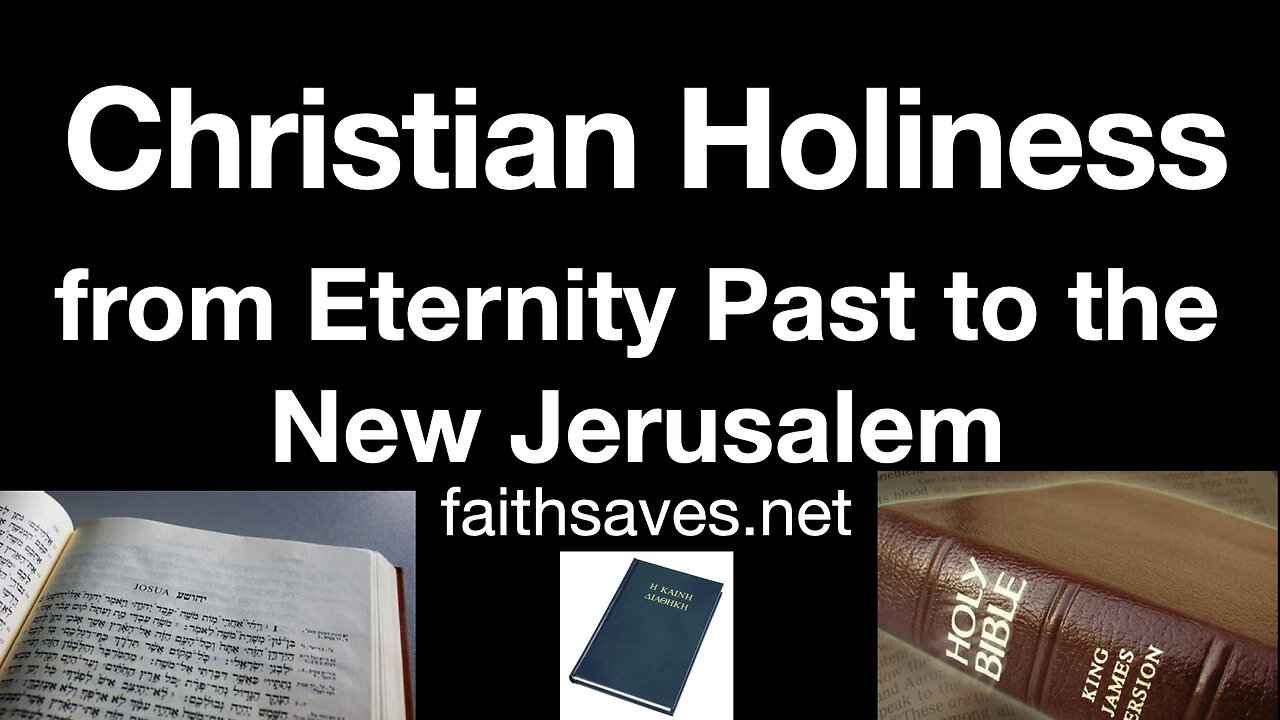Premium Only Content

Christian Holiness / Sanctification—A Summary from Eternity Past to the Eternal State: Word of Truth
"How the Triune God makes His people holy, or Christian Holiness or Sanctification—A Summary from Eternity Past to the Eternal State”
Preached: Thomas Ross, 2020 Word of Truth Conference, Bethel Baptist Church, El Sobrante, CA.
Text: John 17:11-19: “Holy Father … Sanctify them through thy truth: thy word is truth. … [F]or their sakes I sanctify myself, that they also might be sanctified through the truth.”
Outline:
1.) The holy God
2.) His holy purpose
3.) The holy Mediator—and His holy redemption
4.) The holy people
i.) Definitively holy
ii.) Progressively holy
iii.) Ultimately holy
5.) Are you holy?
The message provided an overview of holiness and sanctification.
1.) The holy God
The one true God, Jehovah, is ultimately and uniquely the Holy One:
“Holy, holy, holy, Lord God Almighty, which was, and is, and is to come.” (Revelation 4:8)
“Holy Father” (John 17:11)
The Holy Son: “the Holy One and the Just” (Acts 3:14)
The Holy Spirit: “the Holy Ghost” (John 1:33)
The Old Testament word group is qds: qadesh, qadosh, qodesh, etc.
The original idea of the Old Testament verb is “separation, apartness, sacredness, holy, exalted, separate from human infirmity, impurity, and sin."
The opposite is being "unholy, common, or profane" (Leviticus 10:10).
Jehovah is holy in that He is the transcendently separate One. His Law is also spotlessly holy.
2.) His holy purpose
What is holy and what is unholy, what is clean and what is unclean, cannot, must not, be in contact. But both unholiness and holiness can be transmitted (Exodus 30:29-30).
So God, as the Holy One whose first action after creating light was dividing or separating light from the darkness, had a holy eternal purpose—for a holy people in a holy creation.
The holy God is active not just in destroying the unholy, but in imparting holiness to sinner through the instrumentality of sacrificial death.
3.) The holy Mediator—and His holy redemption
How did God create a holy people? John 17, in the context of the rest of John and of the Bible, teaches that in eternity past the Father chose, set apart, consecrated, or severed His people from the mass of humanity and gave them to His Son, who would become true Man, one with them, being like them in all things except sin, and them redeem them through His sacrificial death. On the righteous ground of His sacrificial death, the Holy Spirit, sent by the Father and the Son in time as He proceeds eternally from them as from one Principle, would unite them to Christ, make them perfectly holy or just legally through the imputation of the righteousness purchased by the incarnate Mediator’s death and shed blood, make them holy inwardly through their lives by the power of His Spirit, and finally make them in every way holy in a holy resurrection, perfectly holy like the incarnate Son. The holy work of the holy Mediator would purchase and pass holiness to the saints—the holy people (John 17:17-19).
4.) The holy people
This holy Mediator, through His holy life which climaxed in His holy offering, sanctified Himself not for His own sake, but for the sake of His people (John 17:19).
Through their union with Him, they are likewise sanctified (Hebrews 2:11).
The holy Mediator make His people holy A.) Definitively; B.) Progressively; and C.) Ultimately.
A.) Definitive sanctification
At the moment of regeneration, the now repentant sinner is definitively and once-for-all set apart from sin and consecrated to God. This eternity-determining act is definitive sanctification. This radical transfer requires that sanctification necessarily follows justification and the new birth. Preservation in faith and perseverance in good works inevitably, although not automatically, flow from definitive sanctification. All who are in Christ are “saints”—“holy ones” (1 Corinthians 1:2).
B.) Progressive sanctification
The new nature granted the elect at the moment of definitive sanctification grows stronger by the grace and strength of the Holy Spirit, through the power of the cross of Christ, in progressive sanctification. Sin's dominion is shattered at the moment of the new birth, and its remnants are progressively eradicated by the Spirit as the new nature grows stronger through grace and gains the victory in its constant war with the flesh, the remnants of indwelling sin (2 Corinthians 7:1; Hebrews 12:14; 10:10, 14).
Progressive sanctification is referred to in other Biblical terms. The Holy Spirit quickens, transforms, strengthens, renews, etc. the believer, making him ever more like the Lord Jesus Christ. The new man is renewed, and the sinful flesh is mortified, by the strength of the Holy Spirit.
iii.) Ultimate sanctification
The new creature is strengthened in progressive sanctification, and the good work continues until the return of Christ, when believers will receive their glorified bodies and be perfectly like Christ, seeing Him as He is-ultimate sanctification, the consummation of glory.
5.) Are You Holy?
-
 16:40
16:40
Russell Brand
6 hours agoTHIS MASSIVELY BACKFIRED...
66.3K290 -
 25:41
25:41
SB Mowing
10 hours agoPICTURE living next to THIS and not knowing what to do…
26.2K16 -
 2:16:01
2:16:01
George Galloway
1 day agoNEW YEAR COUNTDOWN - MOATS with George Galloway - EP 408
47.9K95 -
 18:39
18:39
Stephen Gardner
6 hours ago🔥BREAKING! Trump's SHOCKING New Demand | Biden admits DOJ TARGETED Trump Illegally!
33.3K168 -
 1:20:23
1:20:23
Josh Pate's College Football Show
11 hours ago $10.03 earnedCFP Prediction Special: OhioSt vs Oregon | UGA vs Notre Dame | Texas vs ASU | Boise vs PennSt
66.2K4 -
 7:50:03
7:50:03
Scottish Viking Gaming
9 hours ago💚Rumble :|: SUNDAY FUNDAY :|: Virginia has two Verginers, Change my Mind!
83.1K16 -
 1:49:50
1:49:50
Winston Marshall
2 days agoThe DARK Reality of Socialism - Historian Giles Udy
67.9K75 -
 1:09:28
1:09:28
Sports Wars
8 hours agoBengals STAY ALIVE In OT Thriller, ESPN's Ryan Clark SLAMMED, NFL DESTROYS NBA On Christmas
56.3K6 -
 9:37
9:37
EvenOut
1 day ago $4.47 earnedThe Non-Reflecting Mirror Scare Twin Prank!
49.1K4 -
 11:19
11:19
Tundra Tactical
1 day ago $6.21 earnedI Saw How CMMG Makes Guns.
60.7K7